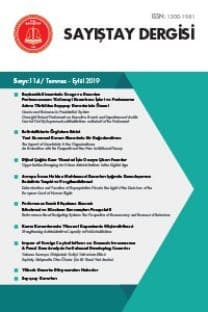Dijital Çağın Bir Vergi Sorunu: Dijital Göçebelerin Vergilendirilmesi
Dijital Göçebe, Dijitalleşme, vergi, uzaktan çalışma, Vergilendirme Sorunları
___
- ADB (2009). Overview of civil society organizations in Pakistan (ARM090528). Asian Development Bank. https://www.adb.org/sites/default/files/publication/28971/csb-pak.pdf
- Akyel, R. and Kose, H. O. (2013). Auditing and governance: Importance of citizen participation and the role of supreme audit institution to enhance democratic governance. Journal of Yasar University, 8(32), 5495-5514.
- Arfeen, M.I., Iqbal, J. and Mushtaq, M.J. (2017). Model for e-Government implementation in Pakistan, Proceedings of 10th International Conference on Theory and Practice of Electronic Governance, ACM, pp. 57-61.
- Arnstein, S. R. (1969). A ladder of citizen participation. Journal of the American Institute of Planners, 35(4), 216-224.
- Baimyrzaeva, M. and Kose, H. O. (2014). The role of supreme audit institutions in improving citizen participation in governance. International Public Management Review, 15(2), 77-90.
- Cameron, W. (2004). Public accountability: Effectiveness, equity, ethics. Australian Journal of Public Administration, 63(4), 59-67.
- DAGP. (2022). FAQs on citizen participatory audit (CPA). www.agp.gov.pk.
- Finance Division. (2022). Demands for grants and appropriations 2022-23. Finance Division, Ministry of Finance, Government of Pakistan. www.finance.gov.pk/budget
- Habib, S. and Rafique, Z. (2019). The role of civil society organizations in the consolidation of democratic system of governance: The case of Pakistan. ISSRA Papers, 11(II), 17–28. Retrieved from https://issrapapers.ndu.edu.pk/site/article/view/19
- Hassan, M. H. and Lee, J. (2019). Policymakers’ perspective about e-government success using AHP approach: Policy implications towards entrenching good governance in Pakistan. Transforming Government: People, Process and Policy, 13(1), 93-118.
- Hussain, M. (2001). The role of Pakistan’s SAI in promoting good national governance. International Journal of Government Auditing, 8(1), 6-7.
- Kim, S. (2015). Side by side with people: Korea’s experiences on participatory audit (95079). Public Participation in the Budget and Audit Process (PPBA), World Bank. https://openknowledge.worldbank.org
- Malena, C. (2004). Social accountability: An introduction to the concept and emerging practice (76). The World Bank.
- Mulgan, R. (1997). The processes of accountability. Australian Journal of Public Administration, 56(1), 25-36.
- Muñez, J.O. (2016). Risk-based regulatory governance through citizens’ participatory internal audit: The Philippine community government procurement case. University of the Philippines Diliman, Quezon City, Philippines.
- National Assembly of Pakistan (1973). The Constitution of the Islamic Republic of Pakistan. National Assembly Secretariat. https://na.gov.pk/uploads/documents/1333523681_951.pdf
- National Assembly of Pakistan (2007). Rules of Procedure and Conduct of Business in the National Assembly, 2007. National Assembly Secretariat. https://na.gov.pk/uploads/publications/rules_procedure.pdf
- Nino, E. (2010). Access to public information and citizen participation in supreme audit institutions (SAI). World Bank Institute (WBI). http://wbi.worldbank.org/wbi/topics/governance
- OECD (2001). Engaging citizens in policy-making: Information, consultation and public participation. OECD PUMA Policy Brief, No: 10 (July).
- PAC (2022, June 24). Public Accounts Committee (PAC) has made a remarkable recovery. https://na.gov.pk/en/pressrelease_detail.php?id=4849
- Pelizzo, R. and Stapenhurst, F. (2013). Government accountability and legislative oversight. Routledge.
- PMDU (2018). Pakistan citizen’s portal (PCP) user’s guidelines manual for complaints and suggestions handling (1st Edition). Prime Minister’s Performance Delivery Unit. https://www.pmo.gov.pk
- PMDU (2022, October 17). Prime Minister’s Performance Delivery Unit - PCP Statistics. https://citizenportal.gov.pk/
- Public Accounts Committee (2022, October 10). About PAC. https://pac.na.gov.pk/?q=about
- Pyun, H. B. (2006). Audit and the civil society: The Korean experience. International Journal of Government Auditing, 33(2), 20-23.
- UN DESA (2007). Auditing for social change: A strategy for citizen engagement in public sector accountability. Division for Public Administration and Development Management. United Nations Publications.
- UN DESA (2013). Citizen engagement practices by Supreme Audit Institutions: Compendium of innovative practices of citizen engagement by Supreme Audit Institutions for public accountability. New York: United Nations.
- UN/INTOSAI. (2011). Effective practices of cooperation between SAIs and citizens to enhance public accountability (21 UN/INTOSAI Symposium). Department of Economic and Social Affairs, UN.
- Waheduzzaman. (2010). People’s participation for good governance: A study of rural development programs in Bangladesh [Doctoral dissertation]. https://vuir.vu.edu.au
- World Bank. (2017). Program appraisal document for a Program-for-Results (PforR). Public financial management and accountability to support service delivery. https://documents1.worldbank.org
- ISSN: 1300-1981
- Yayın Aralığı: 4
- Başlangıç: 1990
- Yayıncı: T.C. Sayıştay Başkanlığı
DÜNYA TİCARET BELİRSİZLİĞİNİN ULUSLARARASI TİCARETE ETKİSİ: TÜRKİYE EKONOMİSİ ÖRNEĞİ
Muhammed Şehid GÖRÜŞ, Mert AKYÜZ
Dijital Çağın Bir Vergi Sorunu: Dijital Göçebelerin Vergilendirilmesi
Türkiye’de Ekonomik Büyüme, Gelir Dağılımı ve Yoksulluk İlişkisi
PAKİSTAN SAYIŞTAYININ VATANDAŞ KATILIMLI DENETİM ÇALIŞMALARININ DEĞERLENDİRİLMESİ
